CNA410 Assessment 1: Reflective Practice and Conflict Management
VerifiedAdded on 2022/09/17
|9
|1985
|20
Essay
AI Summary
This essay delves into the critical role of reflective practice and conflict management within the nursing profession. The student analyzes a personal experience where a senior nurse's actions regarding a patient's deteriorating condition prompted a reflection on the importance of patient-centered care and adherence to nursing standards. The essay highlights the significance of critical thinking, self-awareness, and effective communication, particularly in challenging situations. The student discusses strategies learned from a Registered Nurse to manage conflicts effectively, emphasizing the need for interpersonal skills, addressing issues directly, and utilizing mediators when necessary. The essay also explores the regulatory framework set by the Nursing and Midwifery Board of Australia, emphasizing the importance of professional codes, patient autonomy, and the nurse's scope of practice. An interview with a preceptor is included to reinforce the significance of reflective practice and effective communication in providing quality nursing care and managing professional dilemmas.
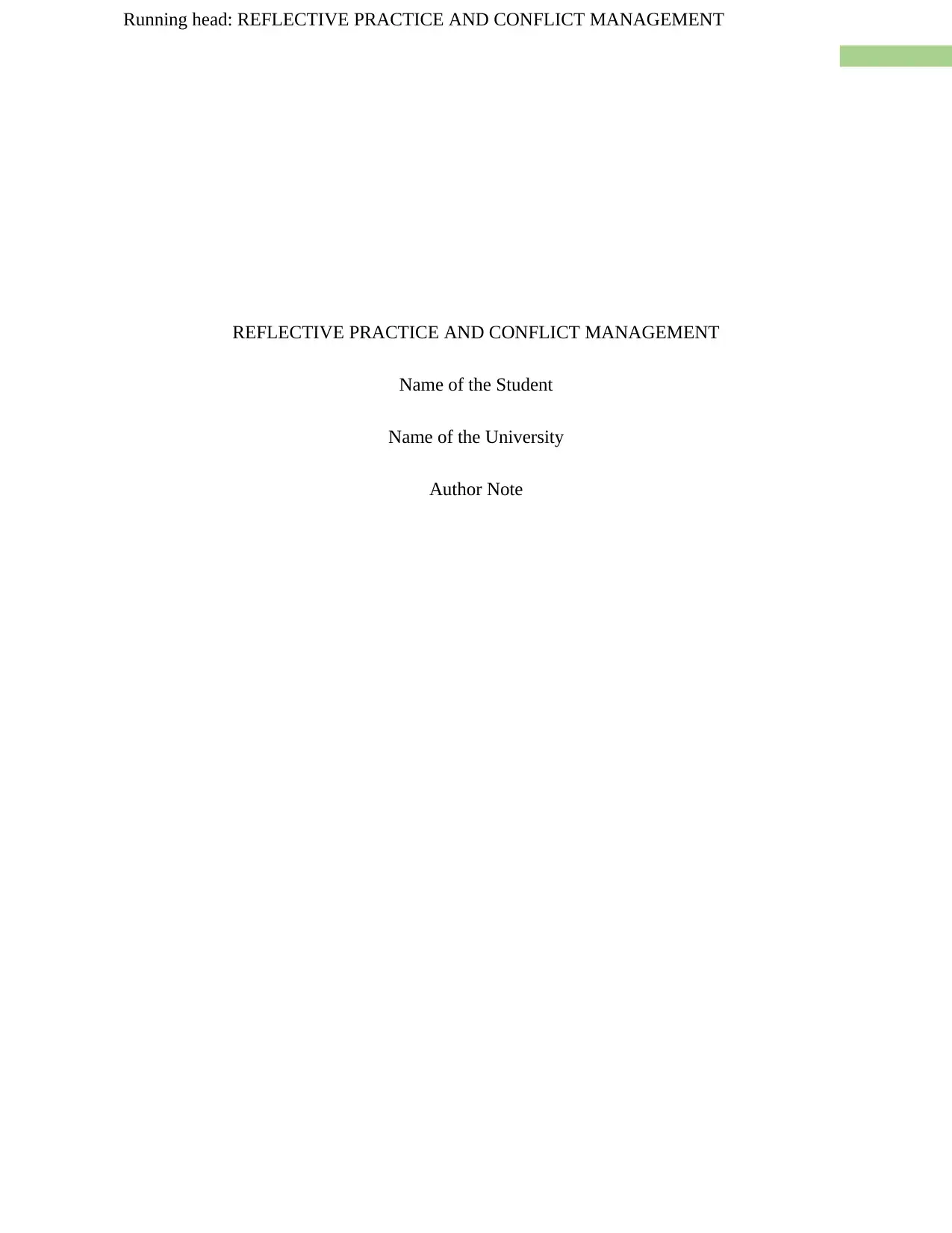
Running head: REFLECTIVE PRACTICE AND CONFLICT MANAGEMENT
REFLECTIVE PRACTICE AND CONFLICT MANAGEMENT
Name of the Student
Name of the University
Author Note
REFLECTIVE PRACTICE AND CONFLICT MANAGEMENT
Name of the Student
Name of the University
Author Note
Paraphrase This Document
Need a fresh take? Get an instant paraphrase of this document with our AI Paraphraser
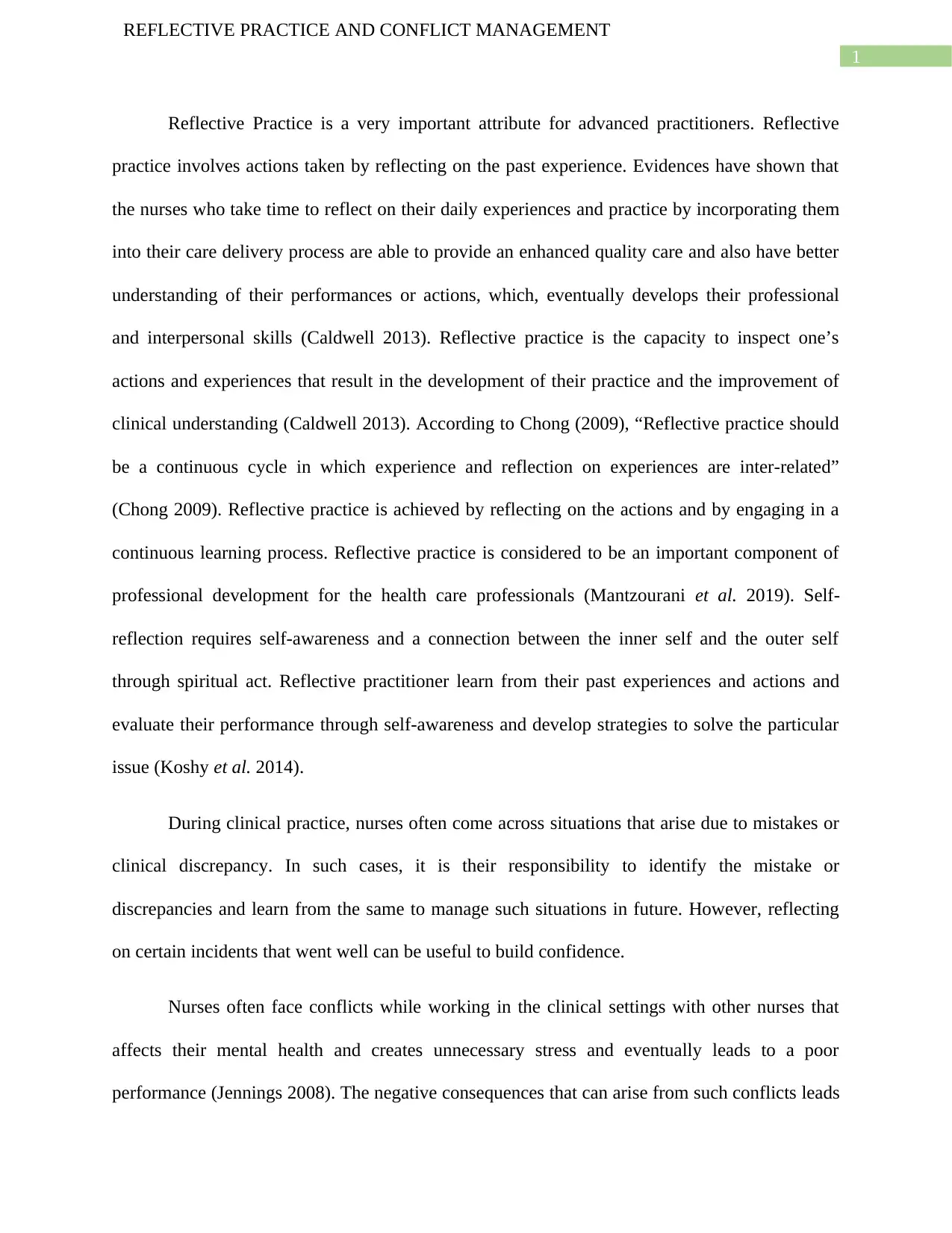
1
REFLECTIVE PRACTICE AND CONFLICT MANAGEMENT
Reflective Practice is a very important attribute for advanced practitioners. Reflective
practice involves actions taken by reflecting on the past experience. Evidences have shown that
the nurses who take time to reflect on their daily experiences and practice by incorporating them
into their care delivery process are able to provide an enhanced quality care and also have better
understanding of their performances or actions, which, eventually develops their professional
and interpersonal skills (Caldwell 2013). Reflective practice is the capacity to inspect one’s
actions and experiences that result in the development of their practice and the improvement of
clinical understanding (Caldwell 2013). According to Chong (2009), “Reflective practice should
be a continuous cycle in which experience and reflection on experiences are inter-related”
(Chong 2009). Reflective practice is achieved by reflecting on the actions and by engaging in a
continuous learning process. Reflective practice is considered to be an important component of
professional development for the health care professionals (Mantzourani et al. 2019). Self-
reflection requires self-awareness and a connection between the inner self and the outer self
through spiritual act. Reflective practitioner learn from their past experiences and actions and
evaluate their performance through self-awareness and develop strategies to solve the particular
issue (Koshy et al. 2014).
During clinical practice, nurses often come across situations that arise due to mistakes or
clinical discrepancy. In such cases, it is their responsibility to identify the mistake or
discrepancies and learn from the same to manage such situations in future. However, reflecting
on certain incidents that went well can be useful to build confidence.
Nurses often face conflicts while working in the clinical settings with other nurses that
affects their mental health and creates unnecessary stress and eventually leads to a poor
performance (Jennings 2008). The negative consequences that can arise from such conflicts leads
REFLECTIVE PRACTICE AND CONFLICT MANAGEMENT
Reflective Practice is a very important attribute for advanced practitioners. Reflective
practice involves actions taken by reflecting on the past experience. Evidences have shown that
the nurses who take time to reflect on their daily experiences and practice by incorporating them
into their care delivery process are able to provide an enhanced quality care and also have better
understanding of their performances or actions, which, eventually develops their professional
and interpersonal skills (Caldwell 2013). Reflective practice is the capacity to inspect one’s
actions and experiences that result in the development of their practice and the improvement of
clinical understanding (Caldwell 2013). According to Chong (2009), “Reflective practice should
be a continuous cycle in which experience and reflection on experiences are inter-related”
(Chong 2009). Reflective practice is achieved by reflecting on the actions and by engaging in a
continuous learning process. Reflective practice is considered to be an important component of
professional development for the health care professionals (Mantzourani et al. 2019). Self-
reflection requires self-awareness and a connection between the inner self and the outer self
through spiritual act. Reflective practitioner learn from their past experiences and actions and
evaluate their performance through self-awareness and develop strategies to solve the particular
issue (Koshy et al. 2014).
During clinical practice, nurses often come across situations that arise due to mistakes or
clinical discrepancy. In such cases, it is their responsibility to identify the mistake or
discrepancies and learn from the same to manage such situations in future. However, reflecting
on certain incidents that went well can be useful to build confidence.
Nurses often face conflicts while working in the clinical settings with other nurses that
affects their mental health and creates unnecessary stress and eventually leads to a poor
performance (Jennings 2008). The negative consequences that can arise from such conflicts leads
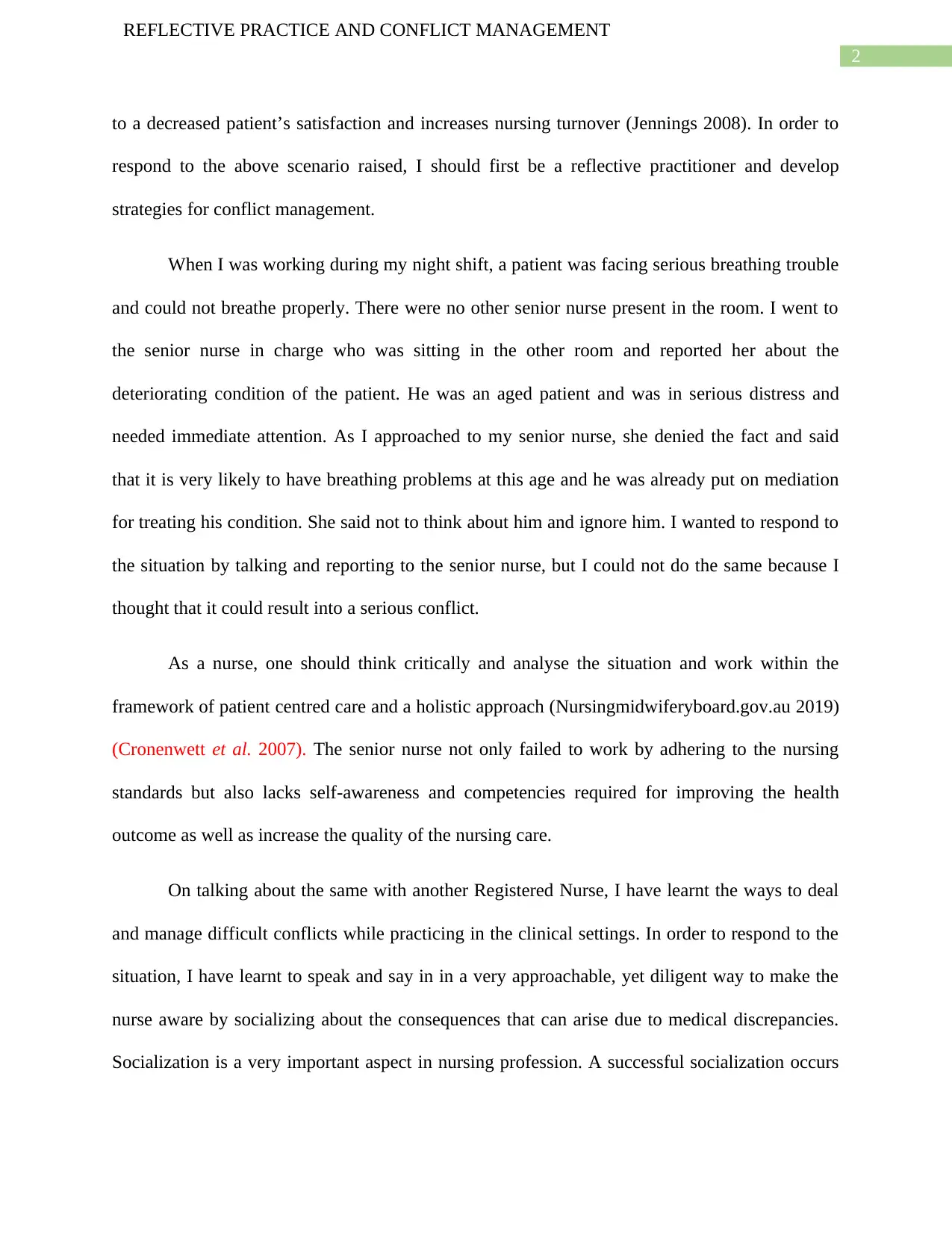
2
REFLECTIVE PRACTICE AND CONFLICT MANAGEMENT
to a decreased patient’s satisfaction and increases nursing turnover (Jennings 2008). In order to
respond to the above scenario raised, I should first be a reflective practitioner and develop
strategies for conflict management.
When I was working during my night shift, a patient was facing serious breathing trouble
and could not breathe properly. There were no other senior nurse present in the room. I went to
the senior nurse in charge who was sitting in the other room and reported her about the
deteriorating condition of the patient. He was an aged patient and was in serious distress and
needed immediate attention. As I approached to my senior nurse, she denied the fact and said
that it is very likely to have breathing problems at this age and he was already put on mediation
for treating his condition. She said not to think about him and ignore him. I wanted to respond to
the situation by talking and reporting to the senior nurse, but I could not do the same because I
thought that it could result into a serious conflict.
As a nurse, one should think critically and analyse the situation and work within the
framework of patient centred care and a holistic approach (Nursingmidwiferyboard.gov.au 2019)
(Cronenwett et al. 2007). The senior nurse not only failed to work by adhering to the nursing
standards but also lacks self-awareness and competencies required for improving the health
outcome as well as increase the quality of the nursing care.
On talking about the same with another Registered Nurse, I have learnt the ways to deal
and manage difficult conflicts while practicing in the clinical settings. In order to respond to the
situation, I have learnt to speak and say in in a very approachable, yet diligent way to make the
nurse aware by socializing about the consequences that can arise due to medical discrepancies.
Socialization is a very important aspect in nursing profession. A successful socialization occurs
REFLECTIVE PRACTICE AND CONFLICT MANAGEMENT
to a decreased patient’s satisfaction and increases nursing turnover (Jennings 2008). In order to
respond to the above scenario raised, I should first be a reflective practitioner and develop
strategies for conflict management.
When I was working during my night shift, a patient was facing serious breathing trouble
and could not breathe properly. There were no other senior nurse present in the room. I went to
the senior nurse in charge who was sitting in the other room and reported her about the
deteriorating condition of the patient. He was an aged patient and was in serious distress and
needed immediate attention. As I approached to my senior nurse, she denied the fact and said
that it is very likely to have breathing problems at this age and he was already put on mediation
for treating his condition. She said not to think about him and ignore him. I wanted to respond to
the situation by talking and reporting to the senior nurse, but I could not do the same because I
thought that it could result into a serious conflict.
As a nurse, one should think critically and analyse the situation and work within the
framework of patient centred care and a holistic approach (Nursingmidwiferyboard.gov.au 2019)
(Cronenwett et al. 2007). The senior nurse not only failed to work by adhering to the nursing
standards but also lacks self-awareness and competencies required for improving the health
outcome as well as increase the quality of the nursing care.
On talking about the same with another Registered Nurse, I have learnt the ways to deal
and manage difficult conflicts while practicing in the clinical settings. In order to respond to the
situation, I have learnt to speak and say in in a very approachable, yet diligent way to make the
nurse aware by socializing about the consequences that can arise due to medical discrepancies.
Socialization is a very important aspect in nursing profession. A successful socialization occurs
⊘ This is a preview!⊘
Do you want full access?
Subscribe today to unlock all pages.

Trusted by 1+ million students worldwide
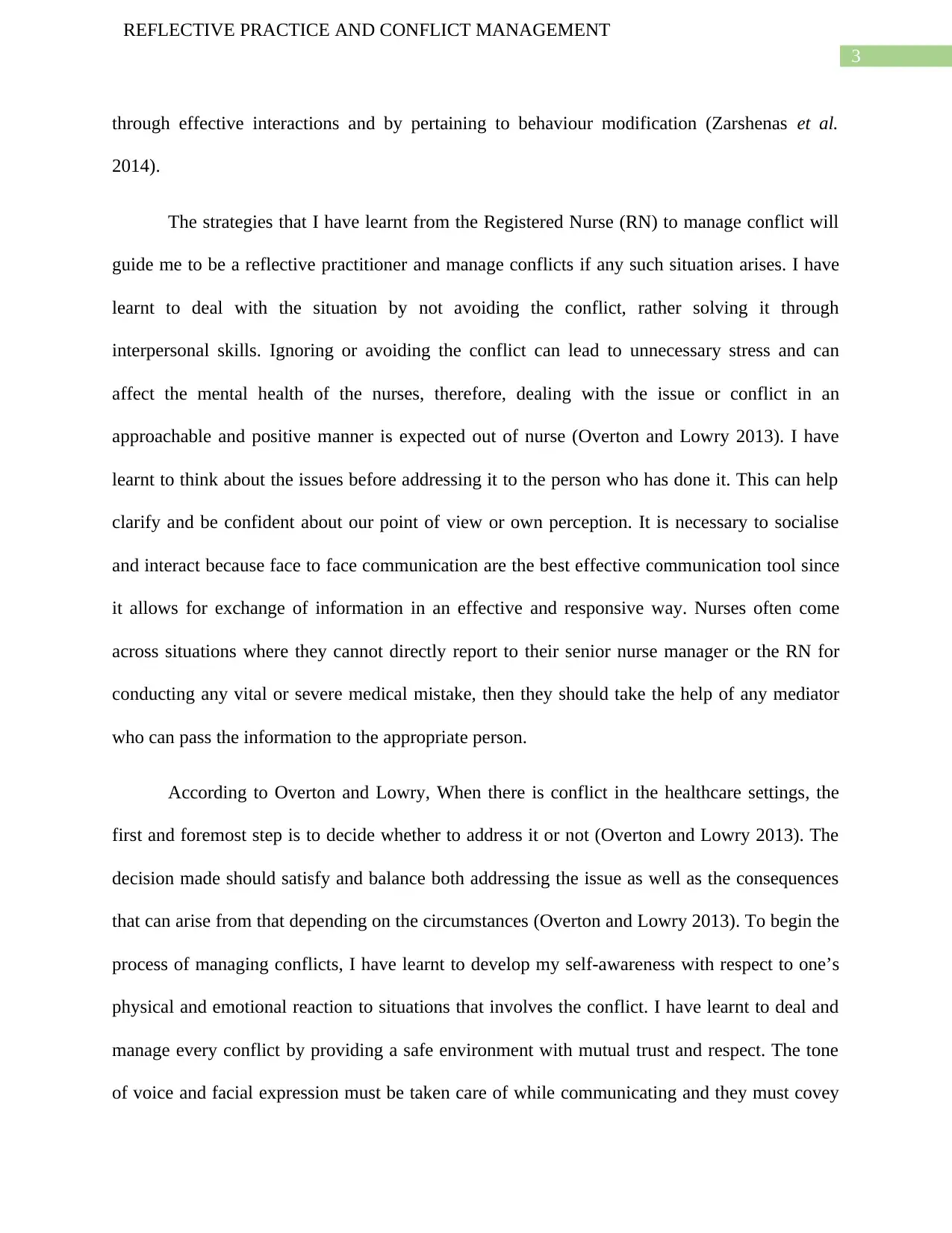
3
REFLECTIVE PRACTICE AND CONFLICT MANAGEMENT
through effective interactions and by pertaining to behaviour modification (Zarshenas et al.
2014).
The strategies that I have learnt from the Registered Nurse (RN) to manage conflict will
guide me to be a reflective practitioner and manage conflicts if any such situation arises. I have
learnt to deal with the situation by not avoiding the conflict, rather solving it through
interpersonal skills. Ignoring or avoiding the conflict can lead to unnecessary stress and can
affect the mental health of the nurses, therefore, dealing with the issue or conflict in an
approachable and positive manner is expected out of nurse (Overton and Lowry 2013). I have
learnt to think about the issues before addressing it to the person who has done it. This can help
clarify and be confident about our point of view or own perception. It is necessary to socialise
and interact because face to face communication are the best effective communication tool since
it allows for exchange of information in an effective and responsive way. Nurses often come
across situations where they cannot directly report to their senior nurse manager or the RN for
conducting any vital or severe medical mistake, then they should take the help of any mediator
who can pass the information to the appropriate person.
According to Overton and Lowry, When there is conflict in the healthcare settings, the
first and foremost step is to decide whether to address it or not (Overton and Lowry 2013). The
decision made should satisfy and balance both addressing the issue as well as the consequences
that can arise from that depending on the circumstances (Overton and Lowry 2013). To begin the
process of managing conflicts, I have learnt to develop my self-awareness with respect to one’s
physical and emotional reaction to situations that involves the conflict. I have learnt to deal and
manage every conflict by providing a safe environment with mutual trust and respect. The tone
of voice and facial expression must be taken care of while communicating and they must covey
REFLECTIVE PRACTICE AND CONFLICT MANAGEMENT
through effective interactions and by pertaining to behaviour modification (Zarshenas et al.
2014).
The strategies that I have learnt from the Registered Nurse (RN) to manage conflict will
guide me to be a reflective practitioner and manage conflicts if any such situation arises. I have
learnt to deal with the situation by not avoiding the conflict, rather solving it through
interpersonal skills. Ignoring or avoiding the conflict can lead to unnecessary stress and can
affect the mental health of the nurses, therefore, dealing with the issue or conflict in an
approachable and positive manner is expected out of nurse (Overton and Lowry 2013). I have
learnt to think about the issues before addressing it to the person who has done it. This can help
clarify and be confident about our point of view or own perception. It is necessary to socialise
and interact because face to face communication are the best effective communication tool since
it allows for exchange of information in an effective and responsive way. Nurses often come
across situations where they cannot directly report to their senior nurse manager or the RN for
conducting any vital or severe medical mistake, then they should take the help of any mediator
who can pass the information to the appropriate person.
According to Overton and Lowry, When there is conflict in the healthcare settings, the
first and foremost step is to decide whether to address it or not (Overton and Lowry 2013). The
decision made should satisfy and balance both addressing the issue as well as the consequences
that can arise from that depending on the circumstances (Overton and Lowry 2013). To begin the
process of managing conflicts, I have learnt to develop my self-awareness with respect to one’s
physical and emotional reaction to situations that involves the conflict. I have learnt to deal and
manage every conflict by providing a safe environment with mutual trust and respect. The tone
of voice and facial expression must be taken care of while communicating and they must covey
Paraphrase This Document
Need a fresh take? Get an instant paraphrase of this document with our AI Paraphraser
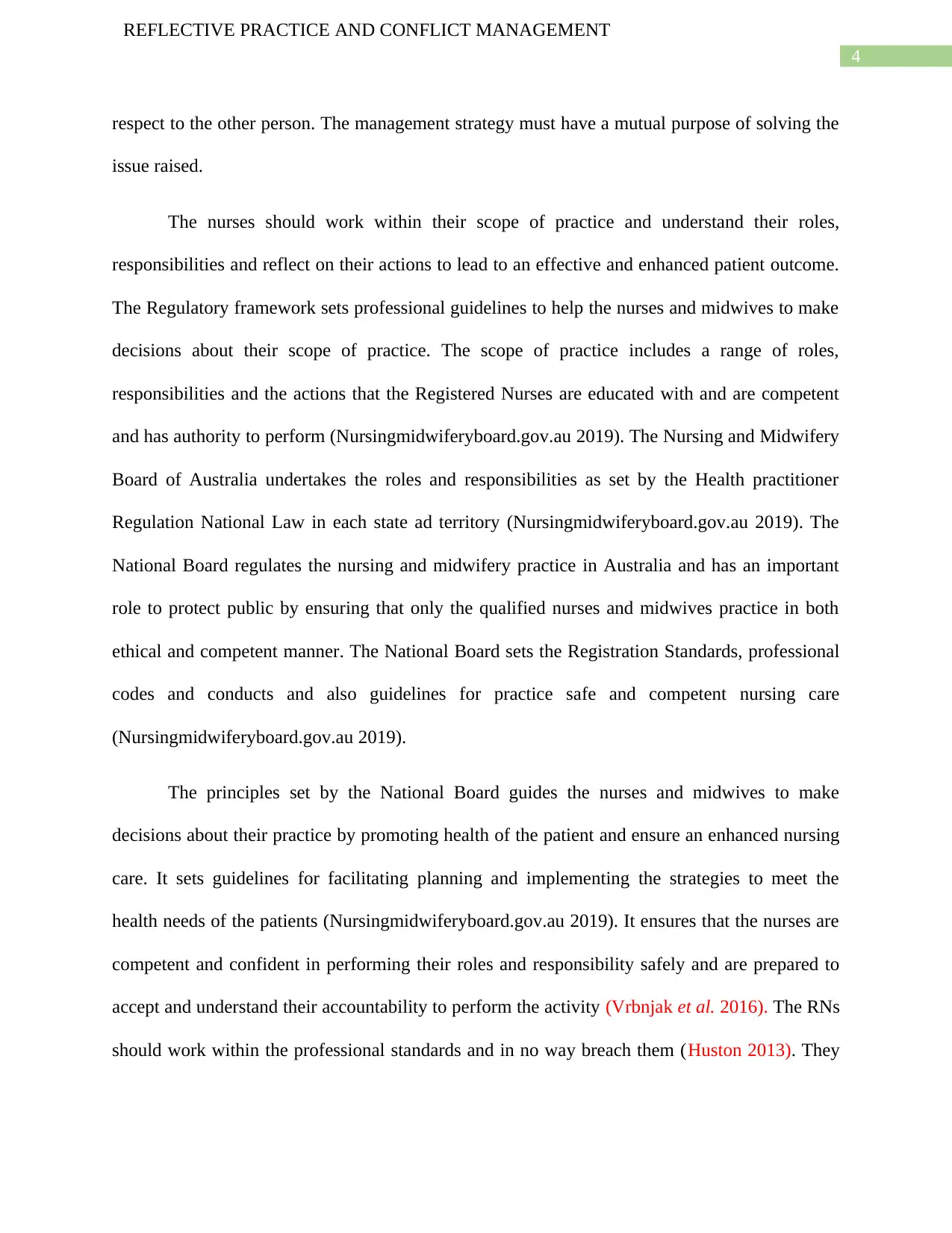
4
REFLECTIVE PRACTICE AND CONFLICT MANAGEMENT
respect to the other person. The management strategy must have a mutual purpose of solving the
issue raised.
The nurses should work within their scope of practice and understand their roles,
responsibilities and reflect on their actions to lead to an effective and enhanced patient outcome.
The Regulatory framework sets professional guidelines to help the nurses and midwives to make
decisions about their scope of practice. The scope of practice includes a range of roles,
responsibilities and the actions that the Registered Nurses are educated with and are competent
and has authority to perform (Nursingmidwiferyboard.gov.au 2019). The Nursing and Midwifery
Board of Australia undertakes the roles and responsibilities as set by the Health practitioner
Regulation National Law in each state ad territory (Nursingmidwiferyboard.gov.au 2019). The
National Board regulates the nursing and midwifery practice in Australia and has an important
role to protect public by ensuring that only the qualified nurses and midwives practice in both
ethical and competent manner. The National Board sets the Registration Standards, professional
codes and conducts and also guidelines for practice safe and competent nursing care
(Nursingmidwiferyboard.gov.au 2019).
The principles set by the National Board guides the nurses and midwives to make
decisions about their practice by promoting health of the patient and ensure an enhanced nursing
care. It sets guidelines for facilitating planning and implementing the strategies to meet the
health needs of the patients (Nursingmidwiferyboard.gov.au 2019). It ensures that the nurses are
competent and confident in performing their roles and responsibility safely and are prepared to
accept and understand their accountability to perform the activity (Vrbnjak et al. 2016). The RNs
should work within the professional standards and in no way breach them (Huston 2013). They
REFLECTIVE PRACTICE AND CONFLICT MANAGEMENT
respect to the other person. The management strategy must have a mutual purpose of solving the
issue raised.
The nurses should work within their scope of practice and understand their roles,
responsibilities and reflect on their actions to lead to an effective and enhanced patient outcome.
The Regulatory framework sets professional guidelines to help the nurses and midwives to make
decisions about their scope of practice. The scope of practice includes a range of roles,
responsibilities and the actions that the Registered Nurses are educated with and are competent
and has authority to perform (Nursingmidwiferyboard.gov.au 2019). The Nursing and Midwifery
Board of Australia undertakes the roles and responsibilities as set by the Health practitioner
Regulation National Law in each state ad territory (Nursingmidwiferyboard.gov.au 2019). The
National Board regulates the nursing and midwifery practice in Australia and has an important
role to protect public by ensuring that only the qualified nurses and midwives practice in both
ethical and competent manner. The National Board sets the Registration Standards, professional
codes and conducts and also guidelines for practice safe and competent nursing care
(Nursingmidwiferyboard.gov.au 2019).
The principles set by the National Board guides the nurses and midwives to make
decisions about their practice by promoting health of the patient and ensure an enhanced nursing
care. It sets guidelines for facilitating planning and implementing the strategies to meet the
health needs of the patients (Nursingmidwiferyboard.gov.au 2019). It ensures that the nurses are
competent and confident in performing their roles and responsibility safely and are prepared to
accept and understand their accountability to perform the activity (Vrbnjak et al. 2016). The RNs
should work within the professional standards and in no way breach them (Huston 2013). They
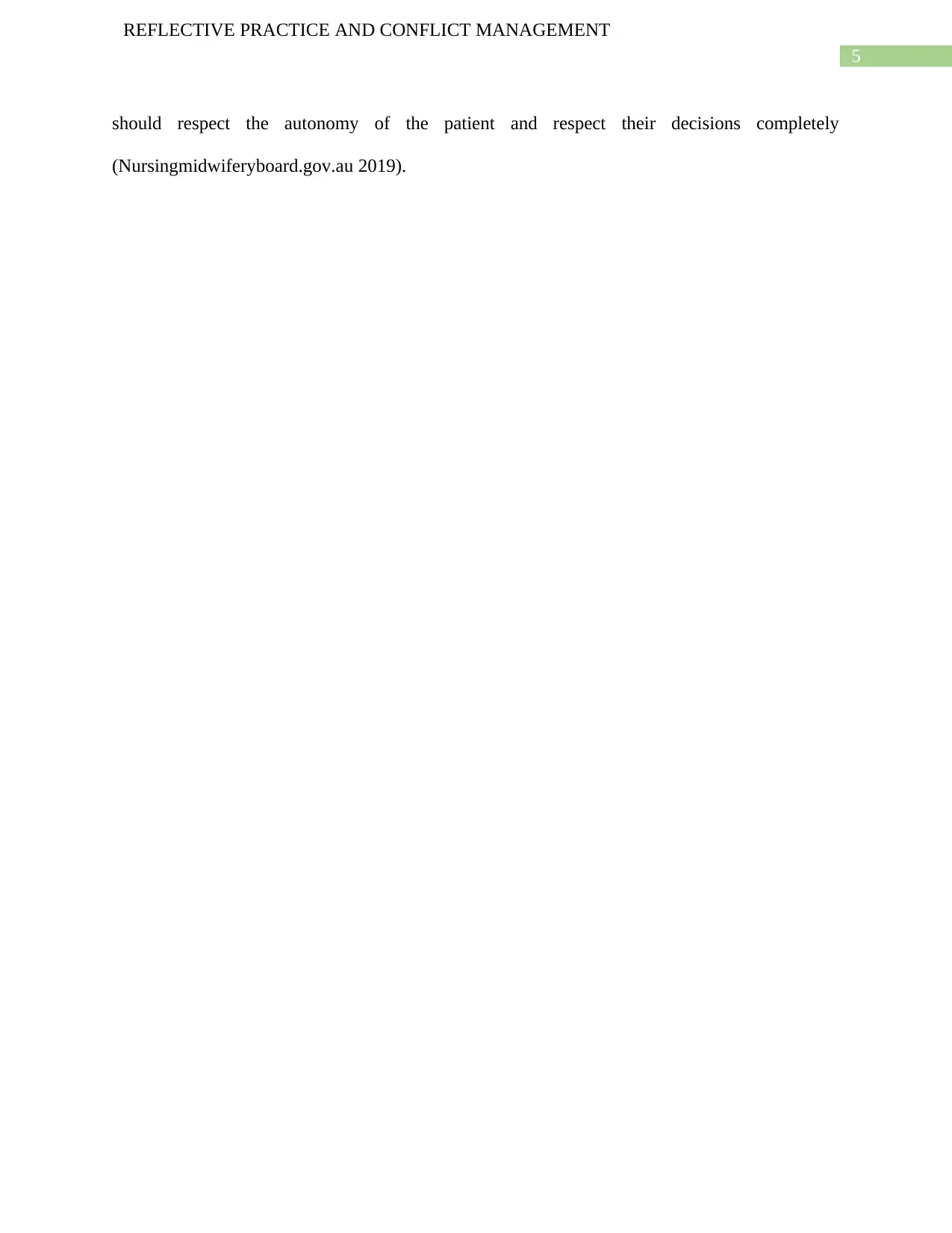
5
REFLECTIVE PRACTICE AND CONFLICT MANAGEMENT
should respect the autonomy of the patient and respect their decisions completely
(Nursingmidwiferyboard.gov.au 2019).
REFLECTIVE PRACTICE AND CONFLICT MANAGEMENT
should respect the autonomy of the patient and respect their decisions completely
(Nursingmidwiferyboard.gov.au 2019).
⊘ This is a preview!⊘
Do you want full access?
Subscribe today to unlock all pages.

Trusted by 1+ million students worldwide
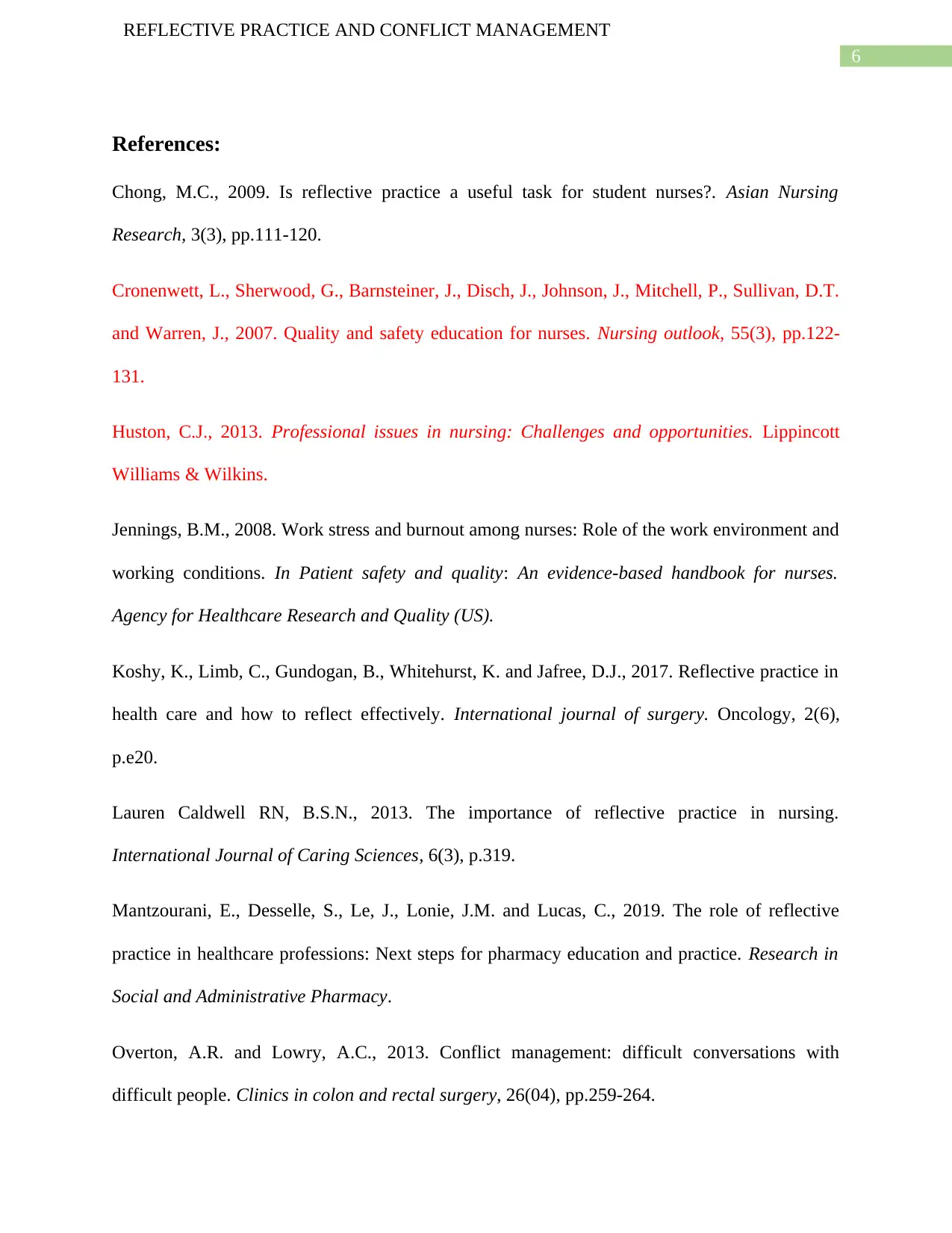
6
REFLECTIVE PRACTICE AND CONFLICT MANAGEMENT
References:
Chong, M.C., 2009. Is reflective practice a useful task for student nurses?. Asian Nursing
Research, 3(3), pp.111-120.
Cronenwett, L., Sherwood, G., Barnsteiner, J., Disch, J., Johnson, J., Mitchell, P., Sullivan, D.T.
and Warren, J., 2007. Quality and safety education for nurses. Nursing outlook, 55(3), pp.122-
131.
Huston, C.J., 2013. Professional issues in nursing: Challenges and opportunities. Lippincott
Williams & Wilkins.
Jennings, B.M., 2008. Work stress and burnout among nurses: Role of the work environment and
working conditions. In Patient safety and quality: An evidence-based handbook for nurses.
Agency for Healthcare Research and Quality (US).
Koshy, K., Limb, C., Gundogan, B., Whitehurst, K. and Jafree, D.J., 2017. Reflective practice in
health care and how to reflect effectively. International journal of surgery. Oncology, 2(6),
p.e20.
Lauren Caldwell RN, B.S.N., 2013. The importance of reflective practice in nursing.
International Journal of Caring Sciences, 6(3), p.319.
Mantzourani, E., Desselle, S., Le, J., Lonie, J.M. and Lucas, C., 2019. The role of reflective
practice in healthcare professions: Next steps for pharmacy education and practice. Research in
Social and Administrative Pharmacy.
Overton, A.R. and Lowry, A.C., 2013. Conflict management: difficult conversations with
difficult people. Clinics in colon and rectal surgery, 26(04), pp.259-264.
REFLECTIVE PRACTICE AND CONFLICT MANAGEMENT
References:
Chong, M.C., 2009. Is reflective practice a useful task for student nurses?. Asian Nursing
Research, 3(3), pp.111-120.
Cronenwett, L., Sherwood, G., Barnsteiner, J., Disch, J., Johnson, J., Mitchell, P., Sullivan, D.T.
and Warren, J., 2007. Quality and safety education for nurses. Nursing outlook, 55(3), pp.122-
131.
Huston, C.J., 2013. Professional issues in nursing: Challenges and opportunities. Lippincott
Williams & Wilkins.
Jennings, B.M., 2008. Work stress and burnout among nurses: Role of the work environment and
working conditions. In Patient safety and quality: An evidence-based handbook for nurses.
Agency for Healthcare Research and Quality (US).
Koshy, K., Limb, C., Gundogan, B., Whitehurst, K. and Jafree, D.J., 2017. Reflective practice in
health care and how to reflect effectively. International journal of surgery. Oncology, 2(6),
p.e20.
Lauren Caldwell RN, B.S.N., 2013. The importance of reflective practice in nursing.
International Journal of Caring Sciences, 6(3), p.319.
Mantzourani, E., Desselle, S., Le, J., Lonie, J.M. and Lucas, C., 2019. The role of reflective
practice in healthcare professions: Next steps for pharmacy education and practice. Research in
Social and Administrative Pharmacy.
Overton, A.R. and Lowry, A.C., 2013. Conflict management: difficult conversations with
difficult people. Clinics in colon and rectal surgery, 26(04), pp.259-264.
Paraphrase This Document
Need a fresh take? Get an instant paraphrase of this document with our AI Paraphraser
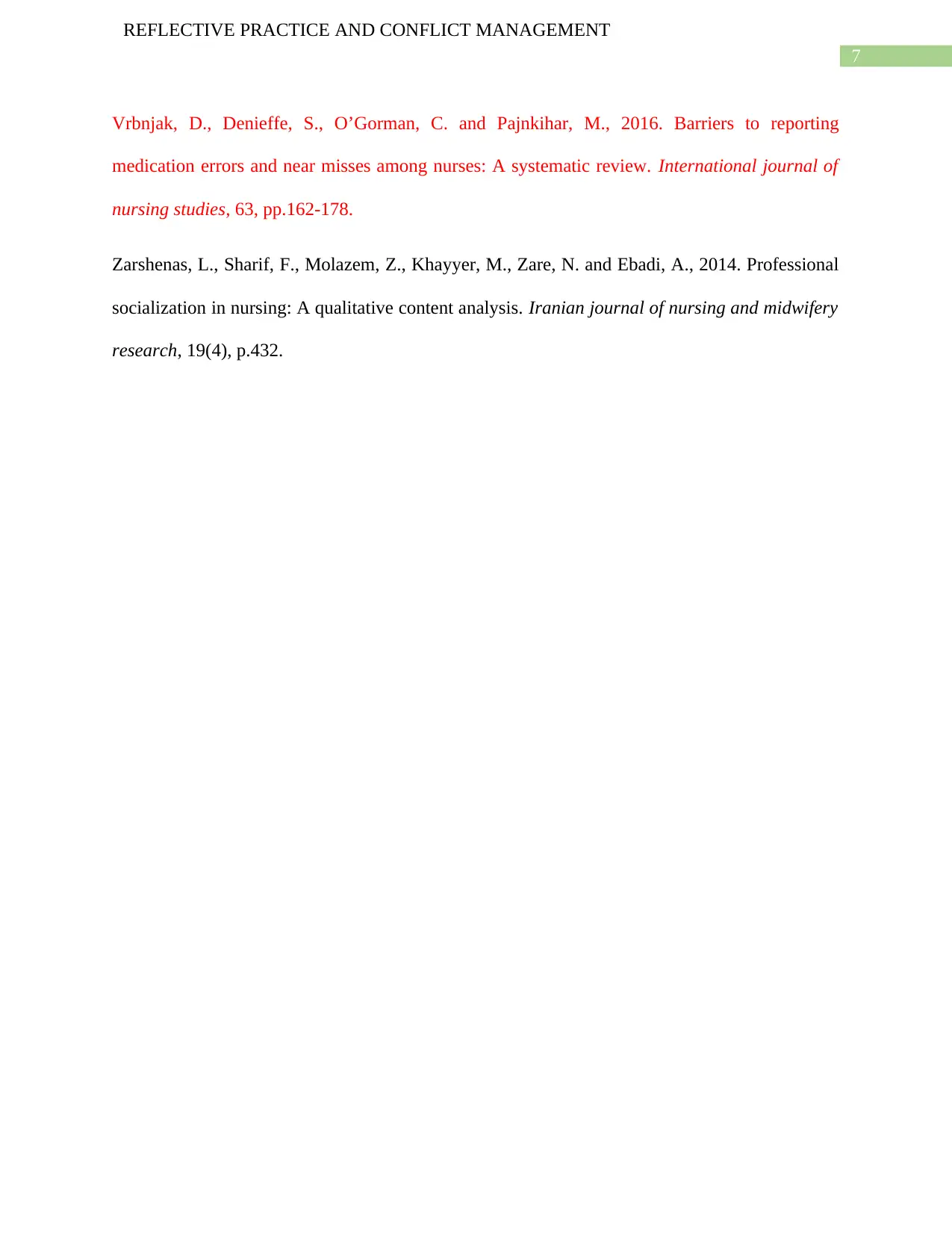
7
REFLECTIVE PRACTICE AND CONFLICT MANAGEMENT
Vrbnjak, D., Denieffe, S., O’Gorman, C. and Pajnkihar, M., 2016. Barriers to reporting
medication errors and near misses among nurses: A systematic review. International journal of
nursing studies, 63, pp.162-178.
Zarshenas, L., Sharif, F., Molazem, Z., Khayyer, M., Zare, N. and Ebadi, A., 2014. Professional
socialization in nursing: A qualitative content analysis. Iranian journal of nursing and midwifery
research, 19(4), p.432.
REFLECTIVE PRACTICE AND CONFLICT MANAGEMENT
Vrbnjak, D., Denieffe, S., O’Gorman, C. and Pajnkihar, M., 2016. Barriers to reporting
medication errors and near misses among nurses: A systematic review. International journal of
nursing studies, 63, pp.162-178.
Zarshenas, L., Sharif, F., Molazem, Z., Khayyer, M., Zare, N. and Ebadi, A., 2014. Professional
socialization in nursing: A qualitative content analysis. Iranian journal of nursing and midwifery
research, 19(4), p.432.
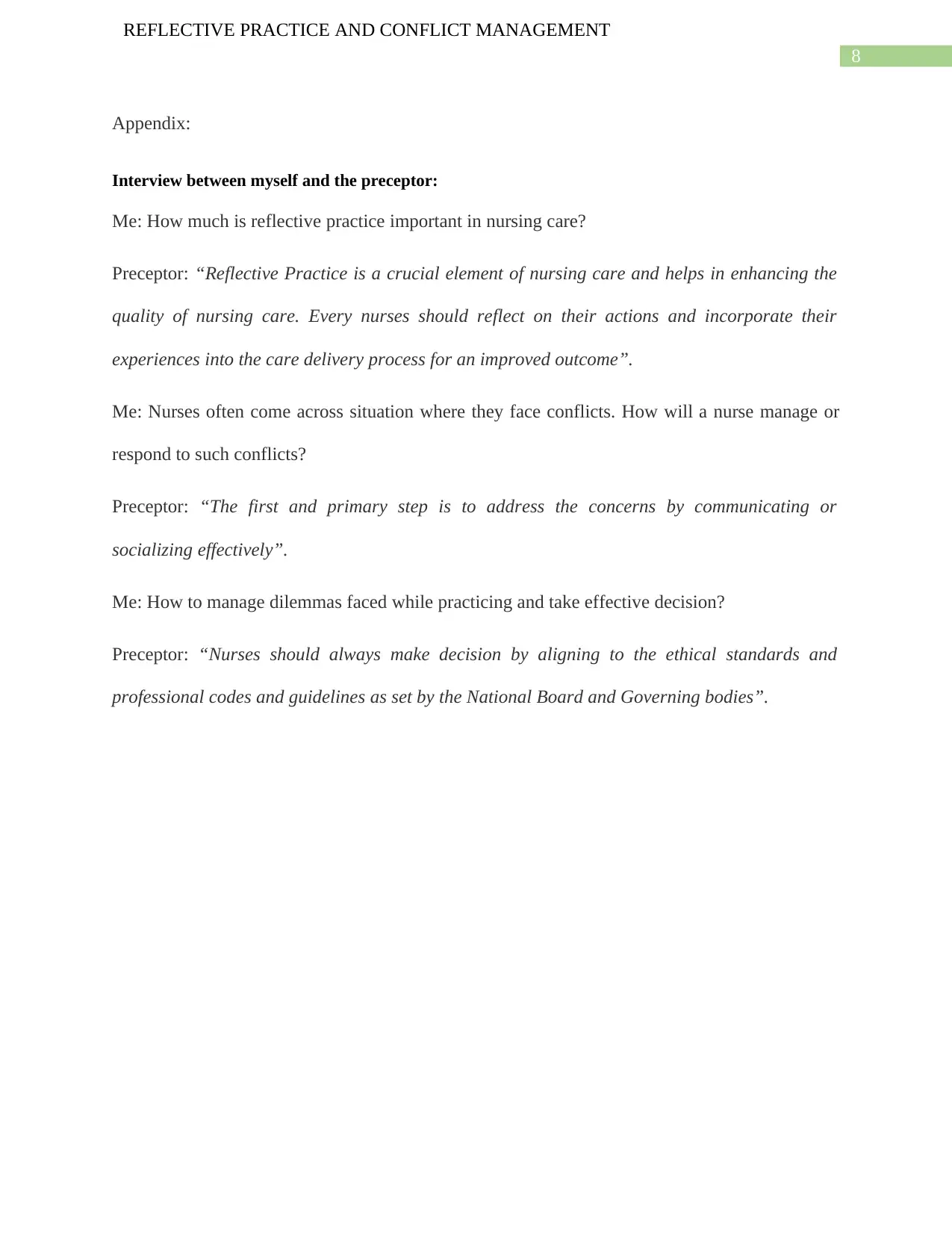
8
REFLECTIVE PRACTICE AND CONFLICT MANAGEMENT
Appendix:
Interview between myself and the preceptor:
Me: How much is reflective practice important in nursing care?
Preceptor: “Reflective Practice is a crucial element of nursing care and helps in enhancing the
quality of nursing care. Every nurses should reflect on their actions and incorporate their
experiences into the care delivery process for an improved outcome”.
Me: Nurses often come across situation where they face conflicts. How will a nurse manage or
respond to such conflicts?
Preceptor: “The first and primary step is to address the concerns by communicating or
socializing effectively”.
Me: How to manage dilemmas faced while practicing and take effective decision?
Preceptor: “Nurses should always make decision by aligning to the ethical standards and
professional codes and guidelines as set by the National Board and Governing bodies”.
REFLECTIVE PRACTICE AND CONFLICT MANAGEMENT
Appendix:
Interview between myself and the preceptor:
Me: How much is reflective practice important in nursing care?
Preceptor: “Reflective Practice is a crucial element of nursing care and helps in enhancing the
quality of nursing care. Every nurses should reflect on their actions and incorporate their
experiences into the care delivery process for an improved outcome”.
Me: Nurses often come across situation where they face conflicts. How will a nurse manage or
respond to such conflicts?
Preceptor: “The first and primary step is to address the concerns by communicating or
socializing effectively”.
Me: How to manage dilemmas faced while practicing and take effective decision?
Preceptor: “Nurses should always make decision by aligning to the ethical standards and
professional codes and guidelines as set by the National Board and Governing bodies”.
⊘ This is a preview!⊘
Do you want full access?
Subscribe today to unlock all pages.

Trusted by 1+ million students worldwide
1 out of 9
Related Documents
Your All-in-One AI-Powered Toolkit for Academic Success.
+13062052269
info@desklib.com
Available 24*7 on WhatsApp / Email
![[object Object]](/_next/static/media/star-bottom.7253800d.svg)
Unlock your academic potential
Copyright © 2020–2026 A2Z Services. All Rights Reserved. Developed and managed by ZUCOL.





